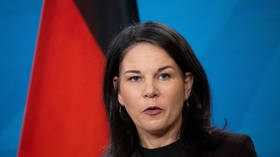Former Israeli general explains importance of close ties with Russia

West Jerusalem needs to maintain a good relationship with Moscow in order to keep its war on Hamas from escalating into a global conflict, retired Israeli Air Force general Israel ‘Relik’ Shafir has said.
Shafir is part of an elite corps of Israeli aviators, having flown the 1981 mission to bomb the Iraqi nuclear reactor in Osirak. He later commanded the main IAF airbase at Tel Nof and the pilot’s school at Hatzor, retiring in 2002 as a brigadier-general after 31 years in service.
Speaking to the Jerusalem Post in an interview published on Thursday, Shafir argued that there was no reason for Israel to antagonize Russia.
“With all respect to those who have the opposite view, but it’s [the] national interest of Israel to keep good relations with Russia, as close as possible and as well as possible,” Shafir said. “We should understand Russia’s interest and know how and where it can correspond to ours. I am not a supporter of [PM Benjamin] Netanyahu, but he understands it well.”
While Shafir insisted that Israel must “crush” Hamas after the October 7 incursion, he argued that this should not be allowed to escalate into a global conflict that would involve the US, Russia, and China.
“There are probably 2 million Russian-speaking people in Israel. We certainly have cultural, humanitarian ties. But there are also the political interests of Israel, an obvious strategic reason: Russia has presence in Syria and is working with Iranians, which makes the game more complicated,” Shafir said. “We definitely should keep good relations with Russia because it gives us some leverage towards Iran.”
The Ukraine conflict “has nothing to do with us,” Shafir said, noting that West Jerusalem has helped Kiev with “all kinds of humanitarian needs,” but that “selling it ammunition is an involvement in conflict, which we don’t want.”
He said the White House’s attempt to link US aid to Ukraine and Israel in the same spending bill is “an internal American matter of how to run the financial and military side in the Congress, which is opposed to the president.”
US President Joe Biden has requested $14 billion for Israel and $61.4 billion for Ukraine as part of a $106 billion emergency spending bill, which has gone nowhere in the Republican-majority House of Representatives. An Israel-only bill adopted in the House was blocked in the Democrat-controlled Senate.
Shafir’s interview was published as part of a Jerusalem Post series called ‘The World is Burning’ by journalist Nick Kolyohin.













